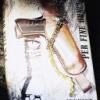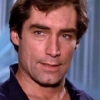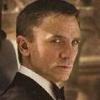Thanks to the extra materials on the OHMSS DVD, we know one famous example of his additional dialogue--the poem, adapted from James Elroy Flecker's The Story of Hassan, that Tracy recites to Blofeld as Draco's helicopters approach.
Thy dawn, O Master of the World, thy dawn;
For thee the sunlight creeps across the lawn,
For thee the ships are drawn down to the waves,
For thee the markets throng with myriad slaves,
For thee the hammer on the anvil rings,
For thee the poet of beguilement sings.
As Tracy recites the last line, Hunt cuts to Bond silhouetted against the sky, framed against the brilliant blood-red sun and cradling his machine-gun, and with Tracy's voice layered over the image and the hum of the helicopter blades, we see that the poet of beguilement is Bond, bringing glorious violence in his wake. It's a brilliant cut--the shot is one of the few pieces of genuine visual poetry in all of the Bond films, aptly counterpointed by the overlay of verbal poetry provided by Raven.
Raven himself was an apt choice to work on the Bond films, since he was familiar with Fleming's work, having reviewed it on several occasions, and was one of Fleming's defenders. His review of Casino Royale compared it to the work of British hard-boiled novelist Peter Cheyney:
All honour, then, to Mr. Fleming for taking the best elements of the Cheyney method (speed, controlled savagery, a pungent and skeptical idiom) and yet combining them with the more spacious and gracious atmosphere of old-fashioned intrigue--monocles, medals and milordos. Mr. Fleming is a Cheyney with a Sandhurst accent.
Raven's only complaint was with the notorious torture scene, which he deemed "too monstrous to be excused." He would later defend Fleming against the accusations of immorality that broke out after the publication of Doctor No:
I have just been reading a long complaint, in the monthly The Twentieth Century, about the unsatisfactory tone of Ian Fleming's novels. The author of this complaint, Bernard Bergonzi, having remarked that these novels are similar to John Buchan's in subject (spies and pursuits), then goes on to say that, whereas Buchan's books are fundamentally decent and do depend on an ethic of sorts, Commander Fleming's tales are without any ethical frame of reference and have an 'affective superstructure' of a perverted and anti-social nature….
Now this is a quiet and well-argued article, but it does appear to reach a most naive conclusion. I mention it here because this type of complaint, about Commander Fleming and others, is increasingly in evidence and has always seemed to me to be entirely beside the point. Since when has it been remarkable in a work of entertainment that it should lack a specific 'ethical frame of reference'? I don't suggest that any of Fleming's books, least of all the latest one, Dr. No, should be left around in the nursery any more than The Relapse or Ars Amatoria. What I do suggest is that Commander Fleming, by reason of his cool and analytical intelligence, his informed use of technical facts, his plausibility, sense of pace, brilliant descriptive powers and superb imagination, provides sheer entertainment such as I, who must read many novels, am seldom lucky enough to find. It may well be, as Mr. Bergonzi suggests, that Fleming's conscious reaction to the dowdiness of the Welfare State has induced him to create fictitious pleasure-domes so splendiferous as to be merely vulgar: the menus in Dr. No are a joy to read for all that. It may be that James Bond, hero of Dr. No and all Fleming's novels, is indeed the super-colossal father-figure of every juvenile delinquent that ever there was: he certainly 'sends' me. I venture to suppose that, whether you approve of him or not, whether you are a banker, a lawyer, a soldier or a turf accountant, he will 'send' you too.
A few years later Raven would even go on to praise The Man With the Golden Gun: "This book is never boring. It includes an imaginative cabaret, instructions of how to prepare and eat a raw snake, and some amusing business with an old-fashioned virgin tied to a railway line." However, he noted, "Construction is patchy and both sides get away with incompetence which would have been unthinkable or immediately fatal a few years earlier in Bond’s career."
With these sort of credentials Raven was an obvious choice to adapt Fleming and a kindred spirit to Peter Hunt, who was determined to capture the essence of Fleming's work. An article published in Movie Collector (Vol.2 No.2, March 14 1995), which can be read online here, features an interview with Hunt, who had this to say about Raven's involvement:
He did some good dialogue for me. He made some of the dialogue much more intelligent than it really was. It wasn't quite so cardboardy. By that I don't mean to denigrate Richard Maibaum. Certainly with a big spectacular action film you really are working all the time at it and certain things present themselves when you start rehearsing them and setting them up, both in dialogue and in the way that you do it. A script for that sort of thing is not like doing a play where you've got words that really have to have meaning.
Hunt's words raise several issues. First, did Raven's contributions extend beyond reworking Maibaum's dialogue? Raven made much of his income adapting plays and novels for British television, so he would have been suited to adapt Fleming, an author he liked and understood. I doubt that Raven made any great structural changes to the script, but we don't know what sort of little things he might have added to individual scenes--after all, his addition of Flecker's poem after all helped transform Tracy's captivity into a bewitching idyll.
Second issue: if Raven's contribution really was revising Maibuam's lines, it would be interesting to compare Maibaum's draft with the shooting script, which benefited not only from Raven's input but also Hunt's. As Hunt says, "I had a big hand in the script, wrote quite a lot of it as we went, although Maibaum quite justifiably gets the credit because he did it all first. There's a lot of things that were added as we went."
This raises a last issue--while plenty of books have been written about the Bond films in general, very few have addressed the writing process in much detail. How the scripts evolved for each Bond film is one of the most underexplored issues in Bond studies. Very few people have gone to the trouble of looking over multiple drafts and comparing them to see how a film might have evolved in the scripting process and to determine who wrote what. One clear exception is Adrian Turner's excellent book on Goldfinger, which examines Maibaum and Paul Dehn's scripts to show what each man contributed to the project--we find out that the laser was Maibaum's idea, whereas the wittiest lines were Dehn's and so on. This has not been done for OHMSS, but such a project is eminently worth pursuing, due to the high quality of OHMSS, perhaps the best-ever adaptation of Fleming's work.
Edited by Revelator, 27 August 2009 - 10:08 PM.





